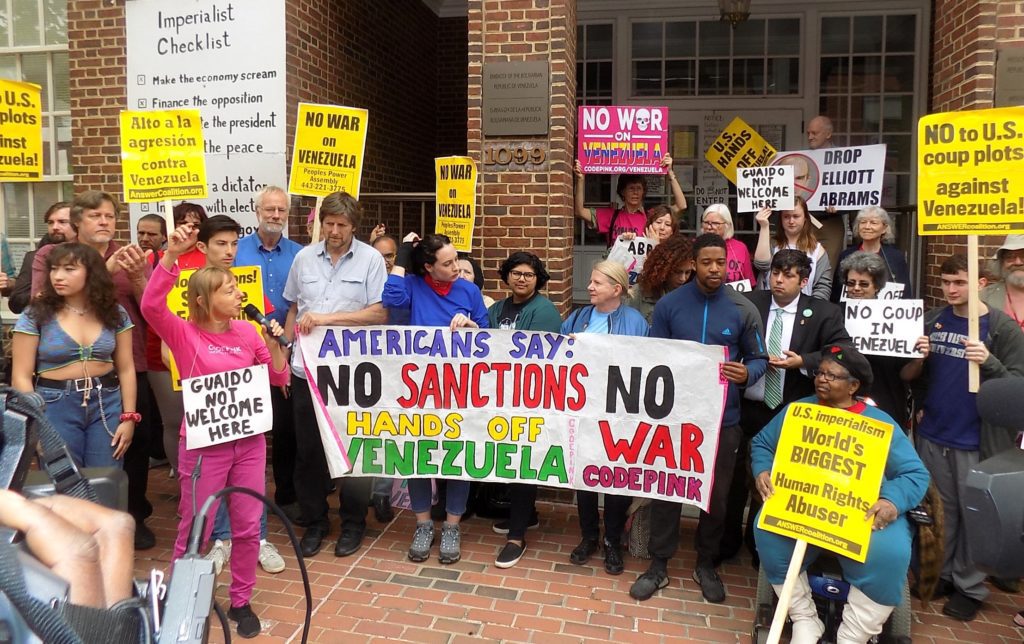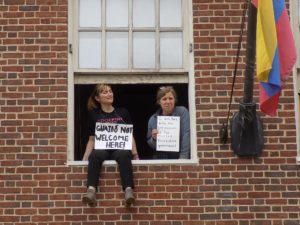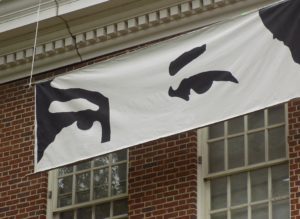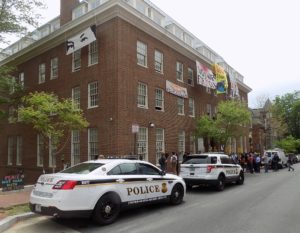Activists Stand Firm at Venezuelan Embassy
By • April 25, 2019 0 1072

The buzz in Georgetown isn’t only local. Sometimes, it’s international.
Along with protests that closed down Sheridan Circle next to the Turkish Ambassador’s Residence and the Romanian Embassy, there were escalating demonstrations at the shuttered Venezuelan Embassy, adjacent to the historic C&O Canal on 30th Street this week.
A planned press conference this morning, Thursday, April 25, brought out several Secret Service vehicles to keep an eye on the lively but peaceful event.
“What we are doing is unprecedented in the history of the United States,” CODEPINK activists told The Georgetowner in front of the four-story brick embassy. Women-led grassroots organization CODEPINK is known for imaginative and highly visible liberal social-justice interventions in Congress and around the District.
“We are a group of American citizens who are physically protecting the Embassy of Venezuela for its people from a hostile takeover by the United States Secret Service and State Department,” said activist lawyer Ann Wilcox.
“And I just spoke out at a speech that U.S. Envoy to Venezuela Elliot Abrams was making before the Atlantic Council,” proclaimed Ariel Gold, who wore a placard reading [Interim President Juan] “Guaidó Not Welcome Here.” “I said, How dare he orchestrate a coup in Venezuela?’”
Members of CODEPINK and Popular Resistance had been spending the night sleeping in chairs and guarding the embassy doors and windows since April 8 as part of a loose organization called the Embassy Protection Collective. They came together after the last diplomats representing President Nicolás Maduro’s administration were forced to leave when the U.S. State Department pulled their diplomatic visas.
The dispute has been escalating ever since Maduro won a six-year term after elections that the U.S. and 50 other nations declared were rigged and illegitimate. In January, the Venezuela National Assembly, headed by Guaidó, invoked Venezuela’s charter to launch an interim government with Guaidó as interim president. After the U.S. recognized Guaidó and revoked the credentials of Maduro’s diplomats, Maduro closed the Venezuelan Embassy here in January.
The Embassy Protection Collective maintains that Maduro is still the president of Venezuela, stating: “The Vienna Convention makes embassy properties inviolate by any other country including the United States.”
“We are here legally with permission from Venezuelan President Nicolás Maduro’s administration. We have the rights of tenancy under D.C. law and any attempt to remove us by U.S. law enforcement would be considered to be an illegal police action,” said Kevin Zeese, spokesman for the collective.
Zeese had just returned from a visit to Caracas. “I saw no starving people, no fleeing refugees. In fact, a food service organization in Venezuela called CLAP delivers six million boxes of food staples to Venezuela citizens regularly because of the U.S. sanctions,” he said.
“The press is not covering the real facts in Venezuela.” said Zeese. “The collective will resist peacefully every effort of the U.S. to take over the embassy and we will stay till they end the sanctions.”




